Abstract
OBJECTIVE: To examine the type and number of interactions of psychiatry residents, interns and clerks with sales representatives of pharmaceutical companies and the attitudes of physicians-in-training toward these interactions. DESIGN: Survey conducted with the use of a self-report questionnaire. SETTING: Seven teaching hospitals affiliated with the Department of Psychiatry, University of Toronto. PARTICIPANTS: All 105 residents, interns and clerks training in psychiatry at the seven teaching hospitals between October 1993 and February 1994 were eligible; 74 completed questionnaires, for a response rate of 70%. One respondent was excluded from the analysis. OUTCOME MEASURES: Number of personal meetings and "drug lunches" attended, number of drug samples and promotional items received and estimated value of gifts received by each physician-in-training during a 1-year period as well as attitudes of residents, interns and clerks about interactions with pharmaceutical representatives. RESULTS: Median number of personal meetings reported was 1 (range 0 to 35), of drug lunches attended was 10 (range 0 to 70), of promotional items received was 2 (range 0 to 75) and of drug samples received was 1 (range 0 to 20). Trainees' median estimate of the value of gifts received was $20 (range $0 to $800 Fewer than one third felt that pharmaceutical representatives were a source of accurate information about drugs; however, 71% (52/73) disagreed with the statement that representatives should be banned from making presentations. Although only 15% (11/73) felt they had sufficient training about meeting with pharmaceutical representatives, 34% (25/73) felt that discussions with representatives would have no impact on their prescribing practices, and 56% (41/73) felt that receiving gifts would have no impact on prescribing. Fewer than half said they would maintain the same degree of contact with representatives if they did not receive promotional gifts. The more money and promotional items a physician-in-training had received, the more likely he or she was to believe that discussions with representatives did not affect prescribing (p < 0.05). Clerks, interns and junior (first-year and second-year) residents attended two to three times more drug lunches than senior (third-year and fourth-year) residents, and significantly more junior than senior residents felt that pharmaceutical representatives have a valuable teaching role. Junior residents were three times more likely than senior residents to have received drug samples. CONCLUSIONS: Interactions between pharmaceutical representatives and psychiatry residents, interns and clerks are common. The physicians-in-training perceive little educational value in these contacts and many, especially clerks, interns and junior residents, disavow the potential of these interactions to influence prescribing. Therefore, supervisors of postgraduate medical training programs may wish to provide instruction concerning potential conflicts of interest inherent in these types of interactions.
Full text
PDF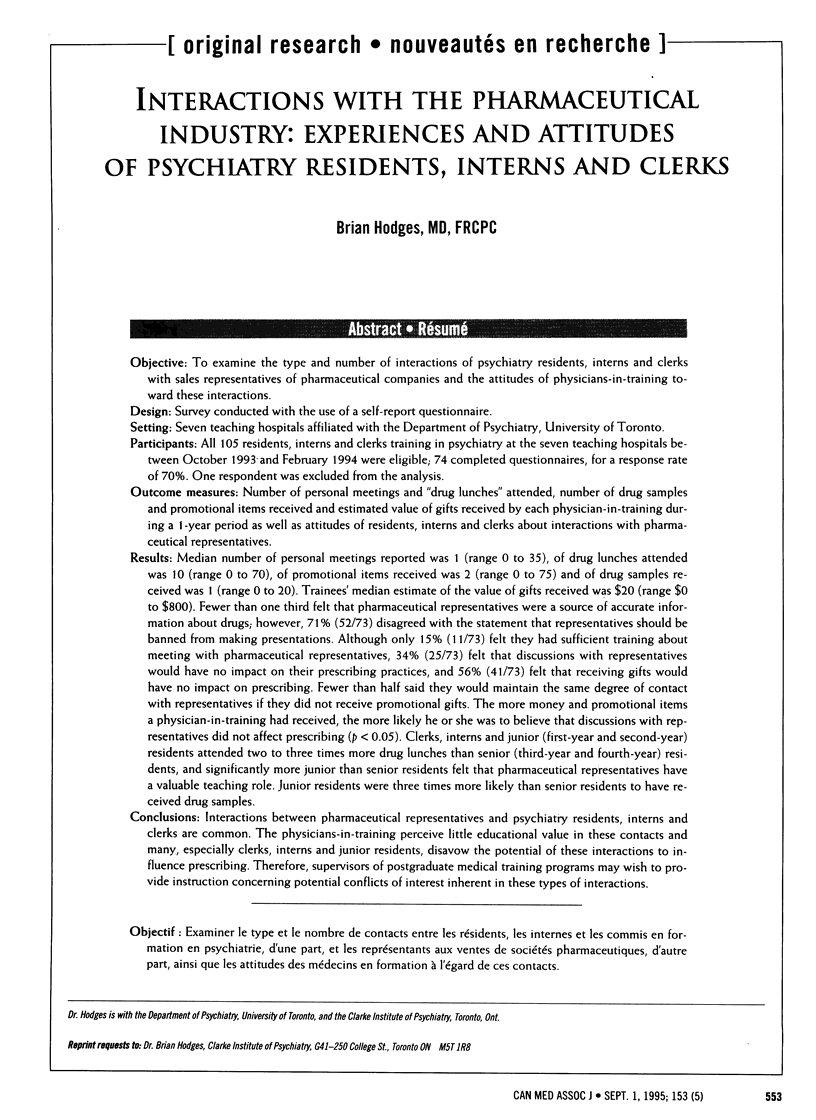
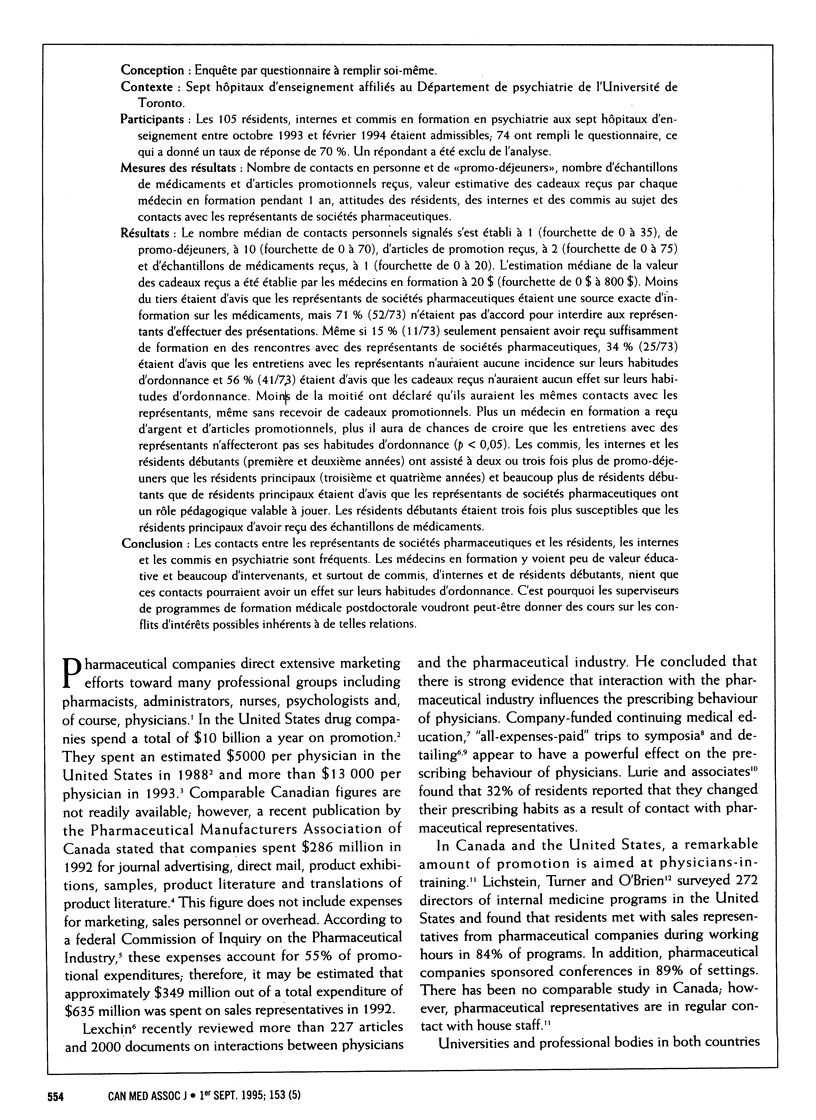
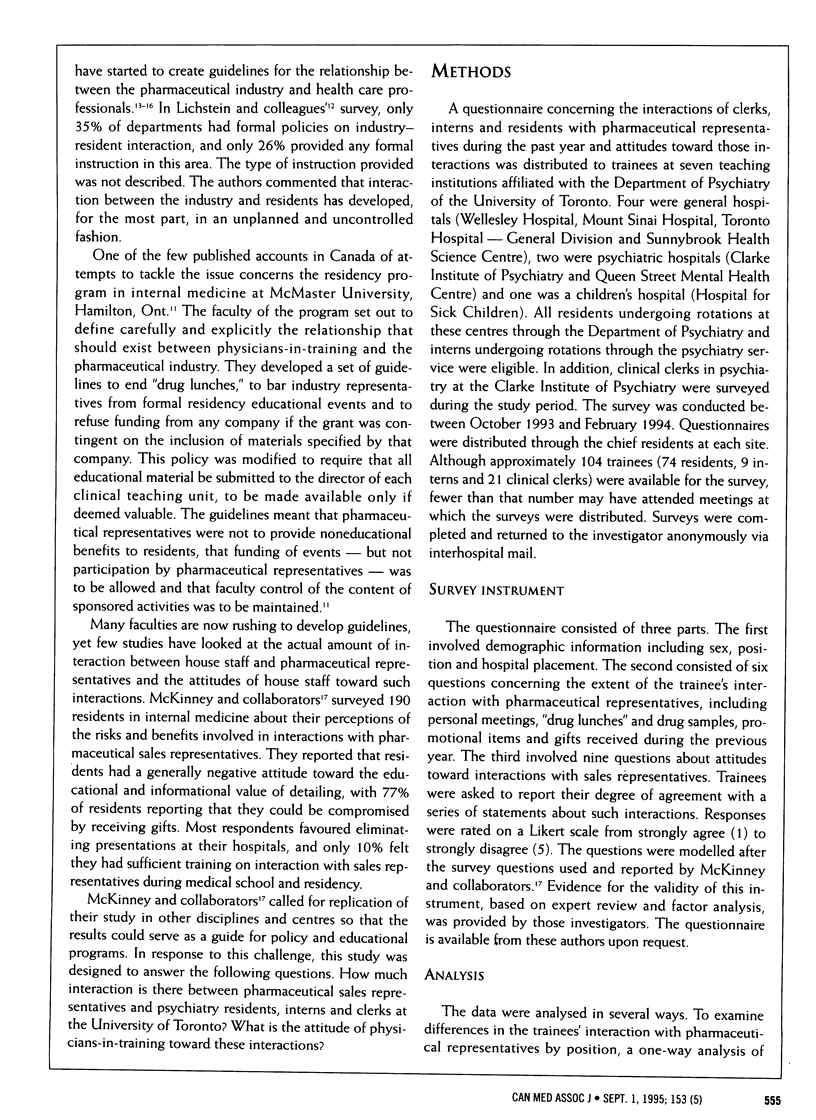
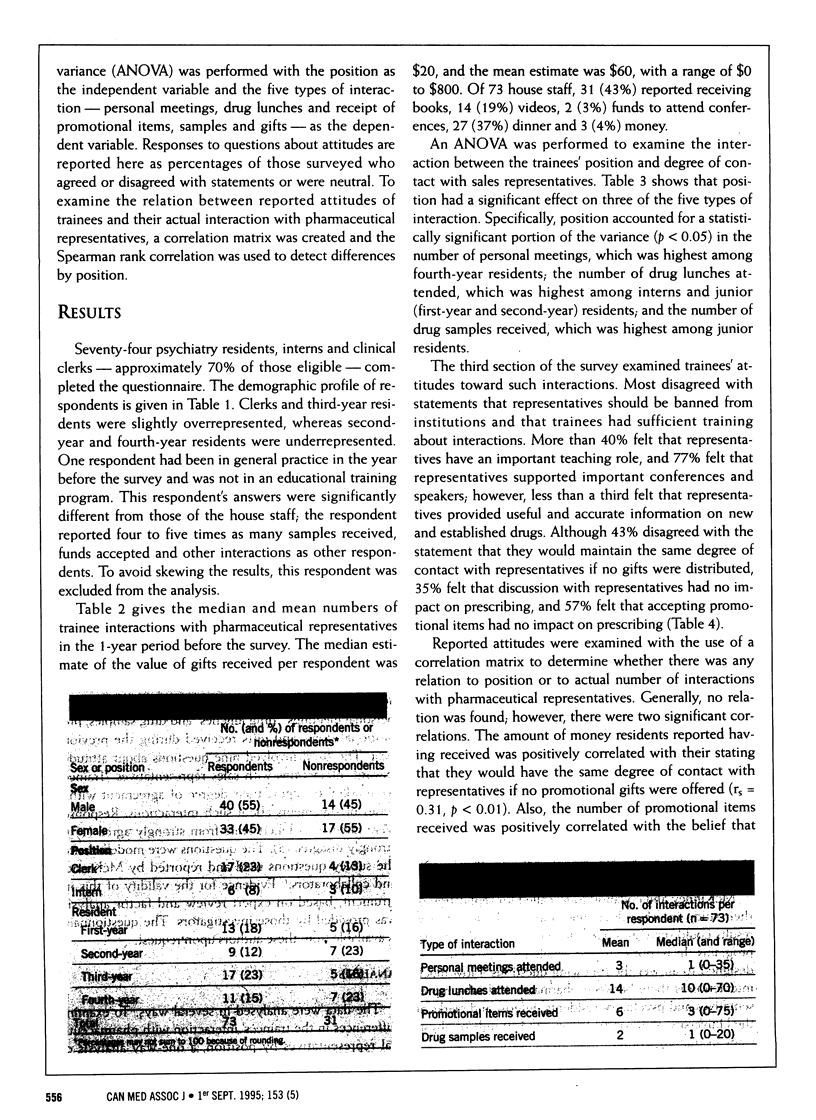
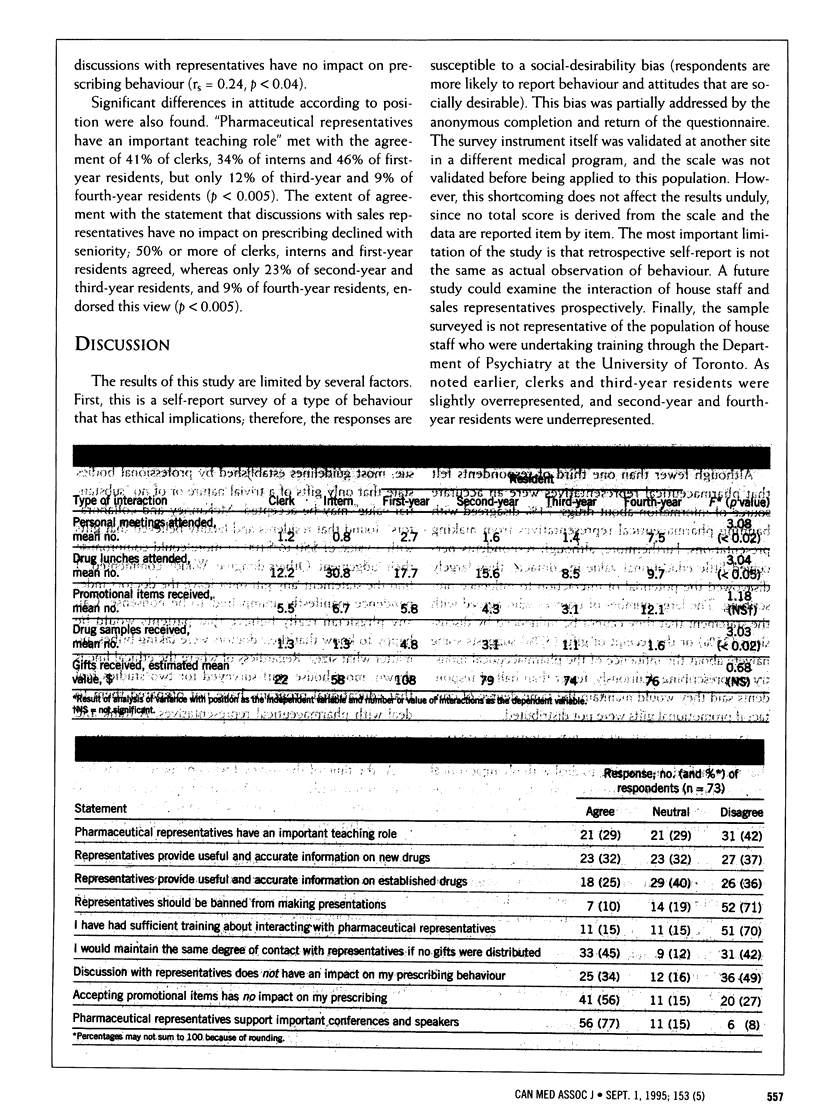
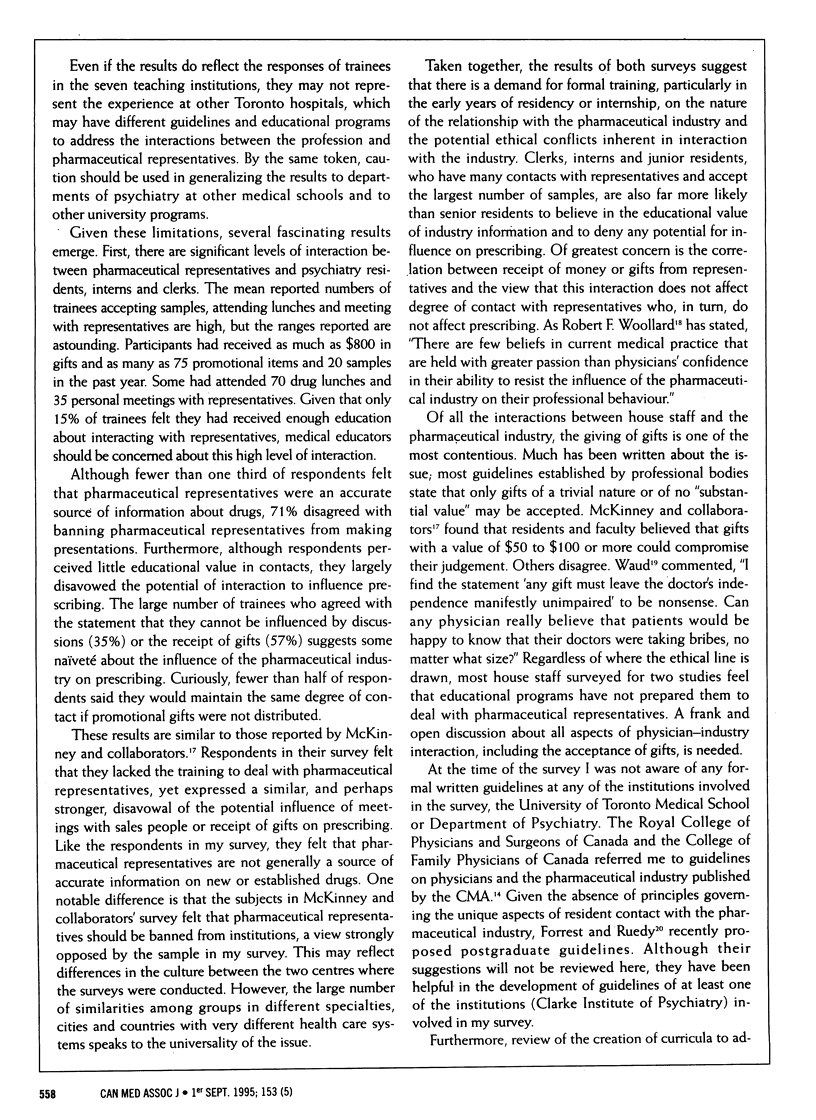
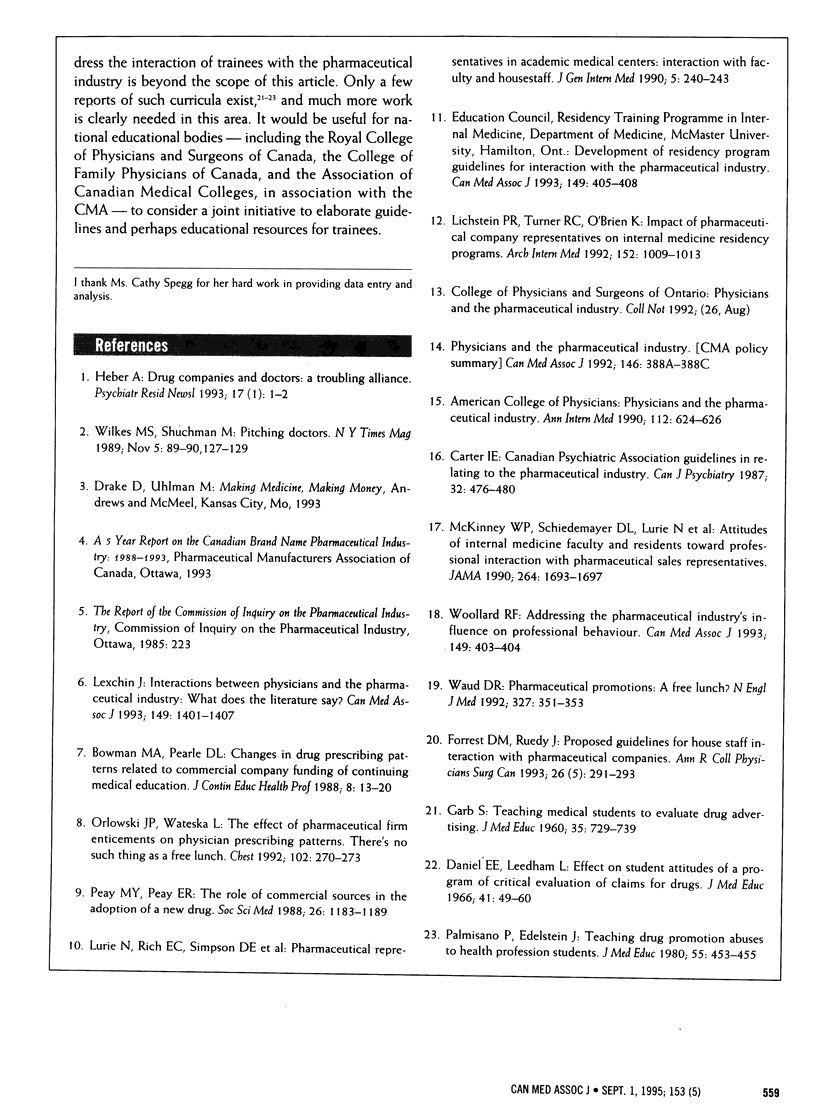
Selected References
These references are in PubMed. This may not be the complete list of references from this article.
- Bowman M. A., Pearle D. L. Changes in drug prescribing patterns related to commercial company funding of continuing medical education. J Contin Educ Health Prof. 1988;8(1):13–20. doi: 10.1002/chp.4750080104. [DOI] [PubMed] [Google Scholar]
- Carter I. E. Canadian Psychiatric Association guidelines in relating to the pharmaceutical industry. Can J Psychiatry. 1987 Aug;32(6):476–486. doi: 10.1177/070674378703200617. [DOI] [PubMed] [Google Scholar]
- Daniel E. E., Leedham L. Effect on student attitudes of a program of critical evaluation of claims for drugs. J Med Educ. 1966 Jan;41(1):49–60. doi: 10.1097/00001888-196601000-00006. [DOI] [PubMed] [Google Scholar]
- Forrest D. M., Ruedy J. Proposed guidelines for housestaff interaction with pharmaceutical companies. Ann R Coll Physicians Surg Can. 1993 Oct;26(5):291–293. [PubMed] [Google Scholar]
- GARB S. Teaching medical students to evaluate drug advertising. J Med Educ. 1960 Aug;35:729–739. [PubMed] [Google Scholar]
- Lexchin J. Interactions between physicians and the pharmaceutical industry: what does the literature say? CMAJ. 1993 Nov 15;149(10):1401–1407. [PMC free article] [PubMed] [Google Scholar]
- Lichstein P. R., Turner R. C., O'Brien K. Impact of pharmaceutical company representatives on internal medicine residency programs. A survey of residency program directors. Arch Intern Med. 1992 May;152(5):1009–1013. [PubMed] [Google Scholar]
- Lurie N., Rich E. C., Simpson D. E., Meyer J., Schiedermayer D. L., Goodman J. L., McKinney W. P. Pharmaceutical representatives in academic medical centers: interaction with faculty and housestaff. J Gen Intern Med. 1990 May-Jun;5(3):240–243. doi: 10.1007/BF02600542. [DOI] [PubMed] [Google Scholar]
- McKinney W. P., Schiedermayer D. L., Lurie N., Simpson D. E., Goodman J. L., Rich E. C. Attitudes of internal medicine faculty and residents toward professional interaction with pharmaceutical sales representatives. JAMA. 1990 Oct 3;264(13):1693–1697. [PubMed] [Google Scholar]
- Orlowski J. P., Wateska L. The effects of pharmaceutical firm enticements on physician prescribing patterns. There's no such thing as a free lunch. Chest. 1992 Jul;102(1):270–273. doi: 10.1378/chest.102.1.270. [DOI] [PubMed] [Google Scholar]
- Palmisano P., Edelstein J. Teaching drug promotion abuses to health profession students. J Med Educ. 1980 May;55(5):453–455. doi: 10.1097/00001888-198005000-00013. [DOI] [PubMed] [Google Scholar]
- Peay M. Y., Peay E. R. The role of commercial sources in the adoption of a new drug. Soc Sci Med. 1988;26(12):1183–1189. doi: 10.1016/0277-9536(88)90149-9. [DOI] [PubMed] [Google Scholar]
- Waud D. R. Pharmaceutical promotions--a free lunch? N Engl J Med. 1992 Jul 30;327(5):351–353. doi: 10.1056/NEJM199207303270511. [DOI] [PubMed] [Google Scholar]
- Wilkes Michael S., Shuchman Miriam. Pitching doctors. N Y Times Mag. 1989 Nov 5;:88, 90, 126, 128-129. [PubMed] [Google Scholar]
- Woollard R. F. Addressing the pharmaceutical industry's influence on professional behaviour. CMAJ. 1993 Aug 15;149(4):403–404. [PMC free article] [PubMed] [Google Scholar]


